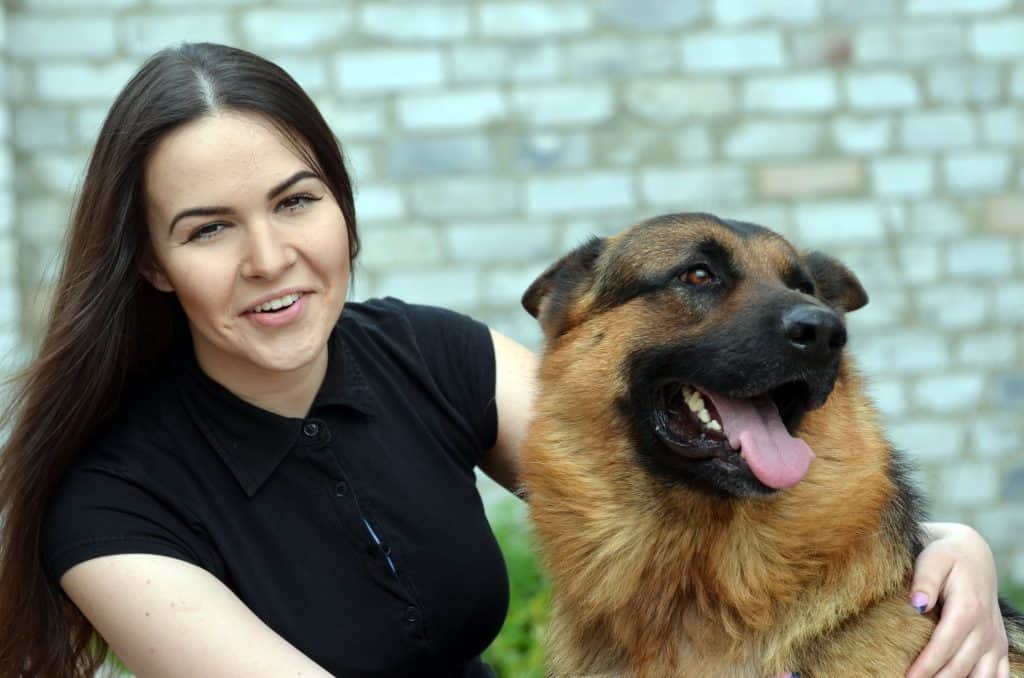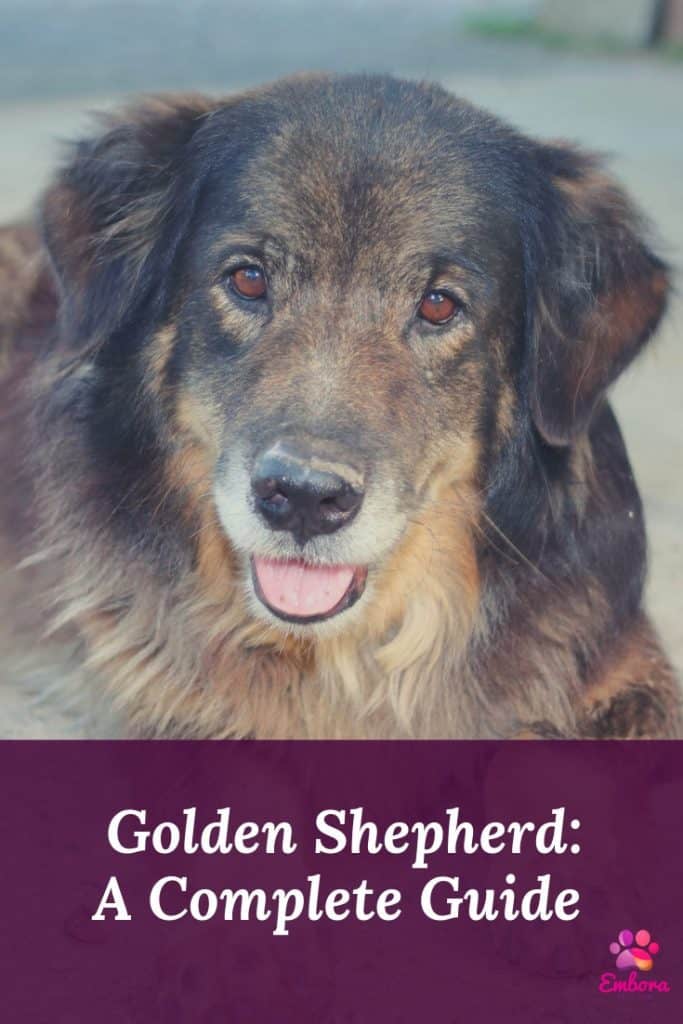German Shepherd/Retriever Mix (Golden Shepherd): A complete guide
The German Shepherd/Retriever mix, also called the Golden Shepherd, is a beautiful mixed breed. If you’re wondering what owning one may be like, here is a complete guide for you!
In this article, I’ll be going over the following:
- A Golden Shepherd’s appearance and characteristics
- Personality and temperament
- Training strategies
- Caring for this breed
- Food and diet
- Cost of ownership
- Compatibility with children
- Compatibility with other animals
Appearance and Characteristics
As is the case with many mixed breeds, the Golden Shepherd has a range of appearances and traits. Many Golden Shepherds have the body build of a German Shepherd and the fur type and head shape of a Golden Retriever.
However, sometimes this standard will change. One Golden Shepherd may look more like a shepherd, while another may look more like a retriever.
In almost every case, however, the Golden Shepherd is a dog of medium size with a long-haired coat that comes in shades of black, gold, and white.
Here are the average statistics you can expect for this breed:
- Lifespan: 10 to 14 years
- Height: 20 to 26 inches (50 to 66 cm)
- Weight: 60 to 85 pounds (27 to 38.5 kg)
Personality and Temperament
The Golden Shepherd’s personality is most often a mixture between the courageous German Shepherd and the caring Golden Retriever. Every dog is different, but these two breeds have certain characteristics that may influence any mix’s behavior.
The Golden Retriever has a loving temperament. They’re docile, friendly, kind, and love to stick by their owner’s side. My first dog was a Golden Retriever, and she was the perfect fit for me and my other siblings, as she was very calm and well-tempered against a bunch of young, screaming children.
The German Shepherd is a super hard-working dog. You’ve probably seen them working as a service dog or working in government positions, such as police dogs or narcotic sniffers. They are loyal, kind, and well-mannered towards their owners. They love to work hard, and they would be a great choice for a guard dog.
Throw those two personalities together, and you have a Golden Shepherd! It is an incredibly intelligent and active breed that loves and wants to protect their family. This breed loves attention, so be sure you can give them plenty of it!
Loving, kind, well-mannered, brave, protective, and watchful… if you’re considering having one as a family dog or just as a companion, then the Golden Shepherd is an excellent breed to have!
Training
Thankfully, German Shepherds and Golden Retrievers are easy to train, so a Golden Shepherd usually reflects this trait.
As is the case with all breeds, make sure to socialize your Golden Shepherd early. Let them interact with people, children, and other animals often.
Their German Shepherd parent has a tendency of being nervous around strangers (thanks to their protective nature), so try to help them overcome this tendency by starting their socialization as early as possible. Not letting them socialize or not doing it enough can cause aggression towards strangers.
Choosing between owner training and professional training is completely up to the owner. For example, if you have experience in training dogs, then you might consider training a Golden Shepherd. If you don’t have experience or don’t think you’re capable of properly training your pup, then consider enrolling them in an obedience school. Again, it’s completely up to you. There are benefits to both options.
Owner Training:
- Custom training: Your dog can be trained according to your specific tasks and needs.
- More control: You’re able to make sure your dog obeys, responds to, and works specifically for you.
- No age limit: Programs sometimes have age limits for dogs, but with owner training, you can start them as early as you want.
- It’s FREE!… Or at least, it costs a lot less than enrollment.
NOTE: If you’re going to train your Golden Shepherd on your own, just remember that it will take a few months with lots of patience, dedication, and perseverance.
Program Training:
- Higher success rate: Professionals are just that- someone who has practiced and has copious amounts of training in a specific field. It’s their job to train dogs. They will know what to do to ensure your dog gets the training they need.
- Professionals will know when they’re done: While less-experienced owners might think training is done because their dog is showing results, professionals will tell if your dog is really done or if they are still learning.

Maintenance
I said earlier that Golden Shepherds need a lot of attention and care. If you or someone you know doesn’t have a lot of time or energy to invest in a dog, you might want to reconsider the pet you’re getting. A lot of effort goes into taking care of this breed.
Golden Shepherds come from two hard-working breeds, so they need to have at least 1 to 2 hours of exercise every day to keep them healthy and happy. They can’t sit around all day and do nothing. They’ll get bored, and when dogs get bored, they are most likely to turn to destructive behaviors to burn off their excess energy. These behaviors include barking, chewing, and peeing in the house.
Exercise is simple for them. Walking, running, and hiking
The ideal would be to have a house with a yard that your dog can run around and play in. However, apartment life is also acceptable and can work just as well, as long as they’re getting daily exercise.
Be careful not to overdo the exercising. German Shepherds and Golden Retrievers are prone to having joint problems, so Golden Shepherds are not an exception.
Thanks to their parents, a Golden Shepherd has a thick double-coat. Because of this, they will be moderate to heavy shedders (even MORE so during shedding season). A quick brush every day should be enough to keep the hair under control.
This helps to prevent loose hair from becoming a problem and it gives you the chance to clean off any dirt or muck that might have gotten in their fur from the previous day. Make sure to use a brush that can reach both layers of their coat.
The FURminator Deshedding Tool and the Hertzko Self Cleaning Slicker Brush are great example of such a brush.
COMMENT FROM THE EDITOR: The Furminator and a slicker brush mentioned above are a great combo. In addition, I found this brush and bath tool works really well because the dogs LOVE how it feels. Our’s brings it to us so we will pet him with it! I gets out a lot of the undercoating and gives them a good rub down! Just passing along the idea.
If your Golden Shepherd inherited the floppy ears of a Golden Retriever, then weekly inspection and cleaning will be needed. It’s really easy. Just take a cotton ball and wipe it inside their years. It will prevent dirt build-up and yeast infections that can develop if left untreated. If your dog loves to swim, prevent infections by ensuring that their ears are completely dry after they’re out of the water.
When it comes to bathing, only do it when it is necessary, like when they’re covered in dirt or mud from playing outside. Bathing too often can damage their skin.
Pay attention to their nails and clip them when necessary. It’s also a good idea to brush their teeth weekly to avoid plaque buildup and smelly kisses.
Dogs should be taken to the vet at least once every year for an annual exam. If they’re older, do two visits. These exams will give your vet the chance to examine your dog and determine its health levels.
Food and Diet
Golden Shepherds are big dogs who need to exercise, so they need a diet that fits this lifestyle. A good daily amount for an adult Golden Shepherd is 3/4 to 1 1/2 cups of dry dog food split between two meals.
When it comes to choosing the right brand of food, do some research and make sure you get your food from a reputable manufacturer.
Get a higher quality brand. Now, I don’t mean you should shell out hundreds of dollars every day for one bag of food, but don’t buy off-brand, super cheap dog food from Walmart. These cheaper qualities contain corn (which your dog doesn’t need), and it doesn’t contain the proper nutrients that a dog will need. When looking for a brand, good ones have the following:
- At least 28% protein for puppies / 18% for adults
- At least 17% fat for puppies / 9-15% for adults
- Made from natural ingredients (real meat, veggies, etc.)
- Contains vegetables (for necessary nutrients)
Your pup should be your best friend and a member of your family. Why would you make them eat the equivalent of instant ramen noodles all the time? A lot of cheap dog food isn’t healthy or suitable for their active lifestyle.
I’ve got a list of great dog foods that meet these criteria. If you want to check them out for yourself, just click on the name and it’ll take you where you need to go!
BONUS TIPS: Is your German Shepherd a picky eater? In working with our breeder, we found our dog much preferred Royal Canin dog food over the brand we were giving her. They offer puppy food and adult food that is designed just for the German Shepherd. If you are considering a change of food, I would definitely give this one a try.
Cost
Dogs are expensive. I’ve said it several times, but I’m going to reiterate it. If you’re going to get this adorable breed, you should be aware of the cost that comes with owning and raising them.
| CATEGORY | POTENTIAL COST |
| Initial cost (one-time) | $500 to $800 |
| Food and snacks | $100 to $300 / year |
| Toys and accessories | $50 / year |
| Spay / Neuter (one-time) | $200 |
| Vet checkups | $50 to $100 / year |
| TOTAL FIRST YEAR COST: | $900 to $1450 |
| AFTERWARD ANNUAL COST: | $200 to $450 |
Given that Golden Shepherds usually live between 10 to 14 years, it can cost upwards of about $7,000 to care for one over the span of their lifetime.
Okay, that doesn’t sound too bad. But you need to know that this list isn’t perfect. The average cost for a Golden Shepherd is usually upwards of $800, but it depends on the pedigree and where you buy it from. Some puppies can sell for as much as $1,500.
The good news is there are breeders everywhere. Golden Shepherds are available in many U.S. states, such as California, Illinois, Michigan, Ohio, and Oregon. There are also available in Canada and the UK.
Be absolutely sure to do research on breeders. While you can probably find a puppy at a much cheaper price, such as on Craigslist or free websites, there is a very good chance that the person did not properly breed them, so you’re very likely to get a puppy that has a birth defect or disease.
There have been some cases where owners have gotten lucky with getting a healthy puppy, but I urge you to save yourself the risk and get a puppy from a reputable breeder.
Luckily, there are many clinics that offer quality checkups at low prices, but if your pup develops any joint problems or health issues, the bills can get expensive, increasing the cost by a significant amount.
My list above is just an estimated cost, and that’s assuming that your dog is perfect and blemish-free their entire life… let’s be honest, as much as we hope, it’s probably not going to happen. Make sure that you can afford this 10- to 14-year long journey.
Golden Shepherds and Kids
The Golden Shepherd’s temperament is a combination of two very intelligent, very kind breeds. In fact, the Golden Retriever is one of the most common breeds for family dogs, and I’ve already gone over why. That doesn’t mean that German Shepherds don’t make good family dogs too though! This breed is also loving, patient, and playful.
With the mixed genetics and behaviors of both of these breeds, Golden Shepherds will get along well with families and kids.
If your children are young, make sure they know to respect and play nice with your dog. Don’t let them grab their tail, ears, climb on them, step on them, hit them… basically anything that wouldn’t be okay if they did it to other people.
Although they may have a calm and gentle temperament, a Golden Shepherd doesn’t like pain. If pushed too much, they will retaliate in order to make the pain stop (i.e., nipping, growling, or biting).
These breeds can get along well with children of all ages: babies, toddlers, and young children. Of course, you should supervise these interactions, and you’ll want to be especially careful when they’re around babies. They’re a huge breed, so their playing runs the risk of accidental injuries.
Golden Shepherds and Other Animals
Golden Shepherds love to be around others, and that includes animals.
The infamous stereotype that dogs and cats are mortal enemies is one that we’ve all heard before. But that’s not the case most of the time. Golden Retrievers and German Shepherds usually get along well with cats and other dogs in their own family, so there’s a good chance that your Golden Shepherd will get along with them, too.
How your Golden Shepherd will get along with other animals depends on the individual and how they are introduced. They should be able to get along with animals that they meet on the street as long as they socialized when they were young.
Make sure that you supervise all interactions your dog may have with other animals. While you know they get along with their fellow family animals, you can’t guarantee they’ll show that same friendliness toward strangers. They might get nervous or become aggressive.

Related Questions
- What medical issues are common with Golden Shepherds?
- Allergies
- Eye problems
- OCD
- Joint dysplasia
- Epilepsy
- Von Willebrand’s Disease
- Cancer
- loat
- Degenerative Myelopathy
- Exocrine Pancreatic Insufficiency (EPI)
- Hyperthyroidism
- What other Golden Retrievers mixes are there?
- Golden Doodle – GR & Poodle
- Golden Mountain Dog – GR & Bernese Mountain Dog
- Goldador – GR & Labrador
- Goldendoxie – GR & Dachshund
- Golden Collie – GR & Collie
- Golden Cocker – GR & Cocker Spaniel
- What other German Shepherd mixes are there?
- Shug – GSD & Pug
- Labrashepherd – GSD & Labrador
Shollie – GSD & Collie- Corman Shepherd – GSD & Corgie
- Shepadoodle – GSD & Labradoodle
- Chow Shepherd – GSD & Chow

